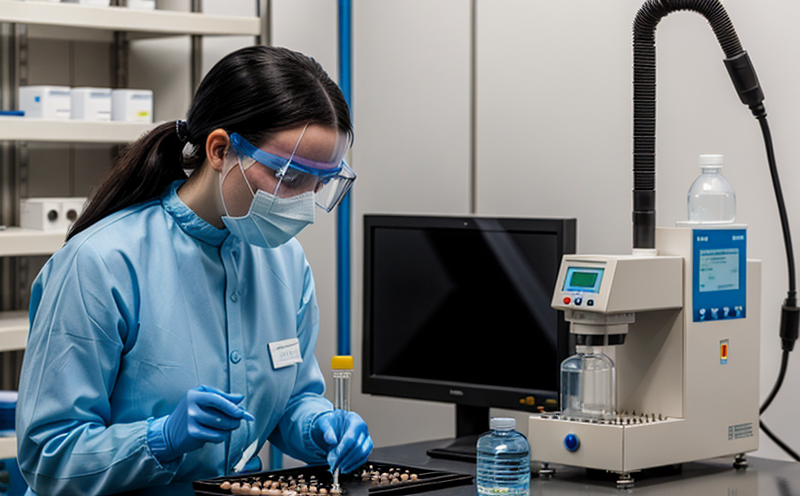LC MS MS Impurity Profiling Testing
The LC MS/MS (Liquid Chromatography Tandem Mass Spectrometry) impurity profiling testing service is a critical component in the pharmaceutical industry, ensuring that drug products meet regulatory standards and are safe for patients. This advanced analytical technique allows for the sensitive detection and quantification of trace impurities and degradation products within a pharmaceutical compound.
LC MS/MS impurity profiling provides insights into the purity profile of active ingredients (APIs) and excipients in drug formulations. By identifying and quantifying even minute amounts of impurities, this service helps quality managers ensure that their products are free from contaminants that could compromise efficacy or safety. This is particularly important for APIs derived from complex chemical syntheses where trace impurities can accumulate.
The testing process involves a series of steps: sample preparation, injection into the LC system, separation by chromatography, and subsequent detection by tandem mass spectrometry. The tandem MS allows for confirmation of the identity of detected compounds through multiple stages of ionization. This ensures high specificity in identifying impurities that might not be detectable using other methods.
The service is especially valuable during drug development phases when optimizing synthesis processes or evaluating the stability of a drug product over time. Regulatory bodies such as the FDA and EMA require thorough impurity profiling, making this testing essential for compliance with international standards like ISO 14971 and ICH Q3D.
LC MS/MS impurity profiling not only supports quality assurance but also aids in risk management by providing detailed information on potential sources of impurities. This helps in refining manufacturing processes to minimize the introduction of unwanted compounds into final drug products. Additionally, this service can be used for environmental monitoring and process optimization in pharmaceutical production facilities.
Scope and Methodology
The scope of LC MS/MS impurity profiling testing encompasses a variety of analytical capabilities tailored to meet the specific needs of pharmaceutical development and manufacturing. The methodology involves several key steps:
| Step | Description |
|---|---|
| Sample Preparation | Involves the extraction and purification of impurities from the drug substance or formulation. This may include solvent-based extraction techniques, solid-phase extraction (SPE), or column chromatography. |
| LC Separation | The purified sample is injected into a high-performance liquid chromatograph to separate impurities based on their chemical properties and interactions with the stationary phase. |
| Tandem MS Detection | The separated compounds are then introduced into the tandem mass spectrometer, where they undergo multiple stages of ionization. This allows for precise identification and quantification of impurities down to parts per billion (ppb) levels. |
| Data Analysis | The raw data from the LC MS/MS system is processed using specialized software to generate comprehensive reports detailing the identity, concentration, and distribution of detected impurities. |
This structured approach ensures accurate and reproducible results that can be relied upon for decision-making in drug development and quality assurance.
Environmental and Sustainability Contributions
The LC MS/MS impurity profiling testing service plays a crucial role in promoting environmental sustainability within the pharmaceutical industry. By identifying trace impurities, this service enables manufacturers to refine their production processes, thereby reducing waste and minimizing the release of harmful substances into the environment.
Through precise impurity profiling, companies can optimize their manufacturing protocols, ensuring that only the intended chemical structures are produced while eliminating by-products or unwanted intermediates. This not only enhances product quality but also reduces the environmental footprint associated with pharmaceutical production.
The service supports compliance with global regulations on sustainable practices and green chemistry principles, as outlined in guidelines from organizations like the Green Chemistry Initiative (GCI). By minimizing the use of hazardous chemicals and reducing waste generation, LC MS/MS impurity profiling contributes to a more environmentally friendly approach to drug development and manufacturing.
Use Cases and Application Examples
- New Drug Development: Identifying impurities in early-stage APIs during lead optimization processes.
- Example: Detecting trace amounts of undesired by-products from a novel synthetic pathway for an antidepressant compound.
- Stability Testing: Monitoring the formation and accumulation of impurities over time in stored drug products.
- Example: Observing the degradation of a beta-lactam antibiotic after six months of storage at various temperatures.
- Process Development: Evaluating the effectiveness of purification steps during API synthesis.
- Example: Assessing the purity of a protein therapeutic after multiple chromatographic polishing steps.
- Quality Control: Ensuring that drug products meet strict regulatory requirements for impurity levels.
- Example: Verifying the absence of heavy metals in an oral contraceptive formulation.





